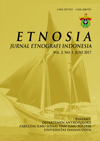Abstract
This article intends to identify and to describe the unique structure and the managing style that owns primordial characteristics, that is giving significance to kinship, religion, and local Bugis cultural values, which made up the cultural system of PT. Hadji Kalla family business. Theoritically, this research was inspired from Weberian perspective on the ideal types of bureaucracy, that observes organizations (in this case is the family business) as one of the socio-cultural phenomena which is neutral and value-free, that is place aside its subjective aspects. The research was conducted in two locations, the head office and one of the branch offices using qualitative approach that relies on participant observation, in-depth interviews, and literature studies. The results of the research shows that the family business of PT. Hadji Kalla that has advanced into national level still prioritizes kinship, ethnicity, and religious aspects in the daily activities of the company. The value even take parts in providing the company’s colour to the urban societies in various districts where the company stands. This means that although the society has undergone transformations, it doesn’t mean that the primordial value, and the elements that exist outside of businesses (such as kinship, big men, religion, cultural values, and interest) do not influence the activities that are held in formal organizations. Therefore, the interventions of subjective aspects will always appear, followed with the application of the modern management system that is implemented by PT. Hadji Kalla company.References
Abdulloh. (2006). Pengaruh Budaya Organisasi, Locus of Control dan Kepuasan Kerja Terhadap Kinerja Karyawan pada Kantor Pelayanan Pajak Semarang. Tesis, Universitas Diponegoro, Master Program in Management, Semarang.
Barrientos, S. (2007). Interrogating Information Through a Literature Study. In A. Thomas, G. Mohan, A. Thomas, & G. Mohan (Eds.), Research Skills for Policy and Development: How to find out fast. (pp. 113-134). Los Angeles, London, New Delhi, Singapore: Sage Publications.
Fatterman, D. M. (2010). Ethnography: Step by Step 3rd Edition. California: SAGE Publications.
Gladwell, M. (2009). Outliers: The Story of Success. New York: Back Bay Books.
Kusdi. (2011). Budaya Organisasi: Teori, Penelitian, dan Praktik. Jakarta: Salemba Empat.
Latief, N. (2009). Hubungan Nilai Budaya Organisasi Dengan Komitmen Organisasi Pada Karyawan Bank Syariah. Skripsi, Universitas Indonesia Depok.
Lewis, D. (2003). NGOs, Organizational Culture, and Institutional Sustainability. The Annals of the American Academy of Political and Social Science , 212-226.
Marpa, N. (2012). Perusahaan Keluarga: Sukses atau Mati. Jakarta: Cergas Media.
Moeljono, D. (2005). Budaya Organisasi dalam Tantangan. Jakarta: Elex Media Komputindo.
Ouchi, Willian G. and Alan L. Wilkins. (1985). Organizational Culture. Annual Review of Sociology. Vol 11 pp. 457-483. Annual Reviews.
Pranata, Samuel, dkk.(2014). Martha dan Ratna: Dua Perempuan di Balik Sukses Martha Tilaar Group (Kepemimpinan Yin-Yang Penuh Kearifan dan Cinta). Jakarta: PT. Gramedia Pustaka Utama.
Robbins, S. P. (1994). Teori Organisasi: Struktur, Desain, dan Aplikasi. Ed 3 Organization Theory: Structure, Design, and Applications. (J. Udaya, Trans.) Jakarta: Arcan.
Supriyanto. (2009). Analisis Pengaruh Budaya Organisasi Terhadap Kinerja Karyawan Dengan Variabel Kepuasan Kerja Sebagai Variabel emediasi Pada PT. Mandrian Klaten. Skripsi, Universitas Muhamadiyah, Fakultas Ekonomi dan Bisnis, Surakarta.
Tjiharjadi, S. (2007). Pentingnya Posisi Budaya dan Efektivitas Organisasi Dalam Kompetisi di Masa Depan. Jurnal Manajemen, 6 (2), 169-178.
Weber, M. (1964). The Theory of Social and Economic Organization. . New York: Free Press.





